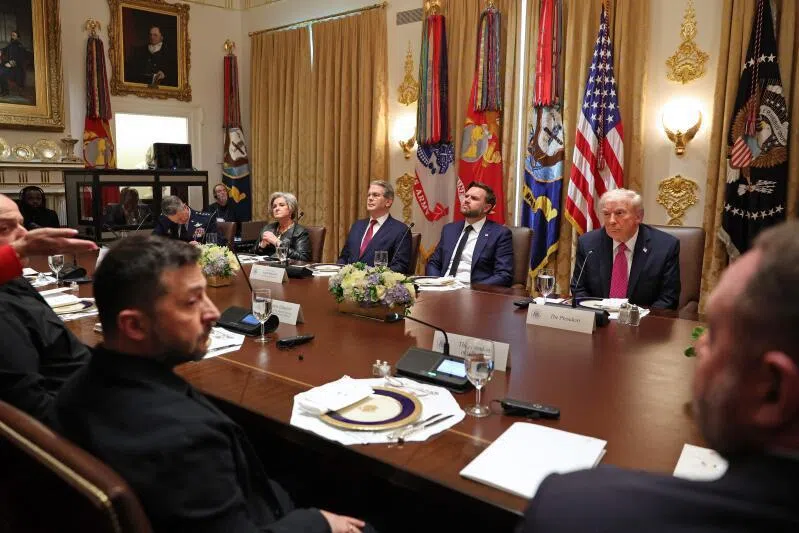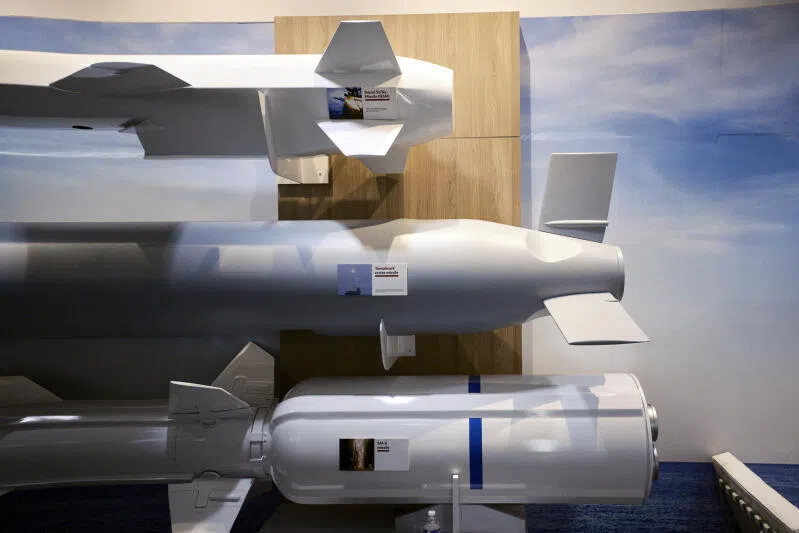WASHINGTON - US President Donald Trump suggested on Oct 17 it would be premature to give Tomahawk missiles to Ukraine, saying as he hosted Ukrainian President Volodymyr Zelensky that the war with Russia could probably be ended without them.
Mr Zelensky, who came to the White House to push for the long-range US-made weapons, said however that he would be ready to swap “thousands” of Ukrainian drones in exchange for Tomahawks.
The US president’s reluctant stance came a day after he and Russian President Vladimir Putin
in the Hungarian capital Budapest.
“Hopefully they won’t need it. Hopefully we’ll be able to get the war over with without thinking about Tomahawks,” Mr Trump told journalists including an AFP reporter as the two leaders met at the White House.
Supplying Ukraine with the powerful missiles despite Mr Putin’s warnings against doing so “could mean big escalation. It could mean a lot of bad things can happen.”

Mr Trump added that he believed Mr Putin, whom he met in Alaska in August in a summit that failed to produce a breakthrough, “wants to end the war.”
Drones for Tomahawks?
Mr Zelensky congratulated Mr Trump on his recent Middle East peace deal in Gaza and said he hoped he would do the same for Ukraine. “I hope that President Trump can manage it,” he said.
Ukraine has been lobbying Washington for Tomahawks for weeks, arguing that the missiles could help put pressure on Russia to end its brutal three-and-a-half year invasion.
Mr Zelensky, meeting Mr Trump in Washington for the third time since the US president’s return to power, suggested that “the United States has Tomahawks and other missiles, very strong missiles, but they can have our 1,000s of drones.”
Kyiv has made extensive use of drones since Russia invaded in February 2022.
On the eve of Mr Zelensky’s visit, Mr Putin warned Mr Trump in their call against delivering the weapons, saying it could escalate the war and jeopardise peace talks.
Mr Trump said the United States had to be careful to not “deplete” its own supplies of Tomahawks, which have a range of over 1,600km.
Diplomatic talks on ending Russia’s invasion have stalled since the Alaska summit.
The Kremlin said on Oct 17 that “many questions” needed resolving before Mr Putin and Mr Trump could meet, including who would be on each negotiating team.
But it brushed off suggestions Mr Putin would have difficulty flying over European airspace.
Hungary said it would ensure Mr Putin could enter and “hold successful talks” with the US despite an International Criminal Court (ICC) arrest warrant against him for alleged war crimes.
Trump frustrations
Since the start of his second term, Mr Trump’s position on the Ukraine war has shifted dramatically back and forth.

Initially Mr Trump and Mr Putin reached out to each other as the US leader derided Mr Zelensky as a “dictator without elections.”
Tensions came to a head in February, when Mr Trump accused his Ukrainian counterpart of “not having the cards” in a rancorous televised meeting at the Oval Office.
Relations between the two have since warmed as Mr Trump has expressed growing frustration with Mr Putin.
But Mr Trump has kept a channel of dialogue open with Mr Putin, saying that they “get along.”
The US leader has repeatedly changed his position on sanctions and other steps against Russia following calls with the Russian president.
Mr Putin ordered a full-scale invasion of Ukraine in February 2022, describing it as a “special military operation” to demilitarise the country and prevent the expansion of Nato.
Kyiv and its European allies say the war is an illegal land grab that has resulted in tens of thousands of civilian and military casualties and widespread destruction.
Russia now occupies around a fifth of Ukrainian territory – much of it ravaged by fighting. On Oct 17, the Russian defence ministry announced it had captured three villages in Ukraine’s Dnipropetrovsk and Kharkiv regions. AFP
